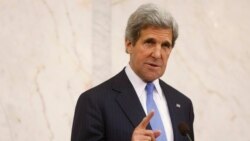STATE DEPARTMENT —
U.S. Secretary of State John Kerry travels Monday to the Middle East for talks on holding a Syrian peace conference.
Syrian President Bashar al-Assad has said he doubts the U.S./Russian initiative can stop the fighting.
The latest effort to end Syrian violence aims to bring together for the first time envoys from President Assad's government and its opponents.
Though Washington and Moscow back different sides in the conflict, Secretary of State Kerry said they are united in getting to a transitional government for Syria.
"Russia and the United States share a belief that it is extremely constructive and positive that we are working together, cooperatively, in an effort to try to implement a peaceful resolution," said Kerry.
UN chief says time is short
U.N. Secretary-General Ban Ki-moon said Kerry and Russian Foreign Minister Sergei Lavrov must move quickly.
"We should not lose this momentum generated by Minister Lavrov and Secretary Kerry," said Ban. "There is a high expectation that this meeting should be held as soon as possible."
But President Assad said there is confusion between a political solution and terrorism.
"We said from the beginning that we are prepared to talk with forces inside or outside of Syria," said Bashar. "We do not have a problem with that, but on condition that they do not carry weapons. You cannot carry a weapon and enter into dialogue."
President Assad said his opponents are too fragmented to negotiate. U.S. Institute of Peace analyst Steve Heydemann says Damascus is rejecting talks on issues central to the conflict.
"Even though they do not want to cause a rift between themselves and the Russians, they are doing everything they can to make sure that these negotiations either do not happen or that they are gamed in such a way that all of the government's issues are defining the contents of the negotiations," Heydemann said.
Assad refuses opposition demands
President Assad says he will not resign. But that remains a core demand of the main opposition group.
"That is not a demand that the U.S. supports" said Heydemann. "It is not a demand that the European Union supports. But if the coalition sticks to it, it is hard to see that this negotiation framework can ever really get off the ground."
Syria's main opposition group is not meeting with Kerry on this trip to the region and has not committed to joining peace talks.
"We think that it is still too early to decide whether to attend because it is not clear what this conference is about," said George Sabra, the opposition's Syrian National Council Chairman. "Until now, there is no agenda or list of countries attending."
That is another problem as Russia says Iran should be included in the talks. The United States has, in the past, opposed Iran's involvement, but says invitations to these talks are still being worked out with the United Nations.
Syrian President Bashar al-Assad has said he doubts the U.S./Russian initiative can stop the fighting.
The latest effort to end Syrian violence aims to bring together for the first time envoys from President Assad's government and its opponents.
Though Washington and Moscow back different sides in the conflict, Secretary of State Kerry said they are united in getting to a transitional government for Syria.
"Russia and the United States share a belief that it is extremely constructive and positive that we are working together, cooperatively, in an effort to try to implement a peaceful resolution," said Kerry.
UN chief says time is short
U.N. Secretary-General Ban Ki-moon said Kerry and Russian Foreign Minister Sergei Lavrov must move quickly.
"We should not lose this momentum generated by Minister Lavrov and Secretary Kerry," said Ban. "There is a high expectation that this meeting should be held as soon as possible."
But President Assad said there is confusion between a political solution and terrorism.
"We said from the beginning that we are prepared to talk with forces inside or outside of Syria," said Bashar. "We do not have a problem with that, but on condition that they do not carry weapons. You cannot carry a weapon and enter into dialogue."
President Assad said his opponents are too fragmented to negotiate. U.S. Institute of Peace analyst Steve Heydemann says Damascus is rejecting talks on issues central to the conflict.
"Even though they do not want to cause a rift between themselves and the Russians, they are doing everything they can to make sure that these negotiations either do not happen or that they are gamed in such a way that all of the government's issues are defining the contents of the negotiations," Heydemann said.
Assad refuses opposition demands
President Assad says he will not resign. But that remains a core demand of the main opposition group.
"That is not a demand that the U.S. supports" said Heydemann. "It is not a demand that the European Union supports. But if the coalition sticks to it, it is hard to see that this negotiation framework can ever really get off the ground."
Syria's main opposition group is not meeting with Kerry on this trip to the region and has not committed to joining peace talks.
"We think that it is still too early to decide whether to attend because it is not clear what this conference is about," said George Sabra, the opposition's Syrian National Council Chairman. "Until now, there is no agenda or list of countries attending."
That is another problem as Russia says Iran should be included in the talks. The United States has, in the past, opposed Iran's involvement, but says invitations to these talks are still being worked out with the United Nations.





